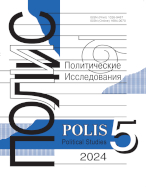Relations of the European Union with the United States and NATO:
dilemmas of euro-atlanticism
Arbatova N.K.,
Primakov National Research Institute of World Economy and International Relations, Russian Academy of Sciences, Moscow, Russia, arbatova@imemo.ru
elibrary_id: 261811 | ORCID: 0000-0001-6640-4532 |
Article received: 2024.05.20 14:47. Accepted: 2024.06.10 14:48

DOI: 10.17976/jpps/2024.04.08
EDN: JVFXKD
Arbatova N.K. Relations of the European Union with the United States and NATO: dilemmas of euro-atlanticism. – Polis. Political Studies. 2024. No. 4. https://doi.org/10.17976/jpps/2024.04.08. EDN: JVFXKD (In Russ.)
This article was prepared with the support of a grant from the Ministry of Science and Higher Education of the Russian Federation for major scientific projects in priority areas of scientific and technological development No. 075-15-2024-551 “Global and regional centers of power in the emerging world order”.
Transatlantic relations have always been central to Western security and defense policy. At the same time, the prospects for the creation of European defense structures from the 1950s to the present day have been a stumbling block in Euro-Atlantic relations. The construction of the defense potential of the European Union until the 90s was considered on both sides of the Atlantic as a purely theoretical project of the distant future, which did not pose a threat to the solidarity of the allies. The gradual formation of the EU’s Common Security and Defense Policy against the backdrop of the crisis in NATO and the aggravation of the international situation resulted in the project of European strategic autonomy, which sharply raised the question of the future configuration of the Euro-Atlantic partnership. This topic has become central to today’s discussions between the European and American strategic communities, assessing how building the EU’s defense potential could impact the role of NATO and the US leadership position in ensuring security in the Euro-Atlantic area.
References
Acheson, D. (1971). The Korean war. New York: W.W. Norton & Company.
Brooks, S.G., & Wohlforth, W. (2016). America abroad: the United States’ global role in the 21st century. New York: Oxford University Press.
Friedman, J.A. (2022). Is US grand strategy dead? The political foundations of deep engagement after Donald Trump. International Affairs, 98(4), 1289-1305. https://doi.org/10.1093/ia/iiac112
Ghouls, E. (2021). Nothing much to do: why America can bring home all troops from the Middle East. Quincy Paper, 7. https://quincyinst.org/research/nothing-much-to-do-why-america-can-bring-all-troopshome-from-the-middle-east/#nor-can-they-close-the-strait-of-hormuz
Howorth, J. (2019). Strategic autonomy and EU-NATO cooperation: a win-win approach. Dans l’Europe en formation, 389, 85-103.
Kaplan, L.S. (1993). Dean Acheson and the Atlantic community. In D. Brinkley (Ed.) Dean Acheson and the Making of US Foreign Policy (pp. 28-54). London: Palgrave Macmillan. https://doi.org/10.1007/978-1-349-22611-5_2
Laïdi, Z. (2019). Can Europe learn to play power politics? Center for European Reform. https://www.cer.eu/publications/archive/essay/2019/can-europe-learn-play-power-politics
Meijer, H., & Brooks, S.G. (2021). Illusions of autonomy. Why Europe cannot provide for Its security If the United States pulls back. International Security, 45(4), 7-43. https://doi.org/10.1162/isec_a_00405. https://direct.mit.edu/isec/article/45/4/7/100571/Illusions-of-Autonomy-Why-Europe-Cannot-Provide
Mearsheimer, J., & Walt, S.W. (2016). The case for offshore balancing. Foreign Affairs, 95(4). https://www.foreignaffairs.com/podcasts/foreign-affairs-interview
Padoa-Schioppa, T. (2004). The Euro and its central bank: getting united after the Union. Cambridge: MIT Press.
Posen, B. (2016). Restraint. Foreign Affairs, 95(4). https://www.foreignaffairs.com/podcasts/foreign-affairs-interview.
Shapiro, J. (2019). Why America? The US role in European defense and the European mind. Paris: Université de Paris I – Panthéon–Sorbonne. https://chairestrategique.pantheonsorbonne.fr/themes/2019/why-america-us-role-european-defense-and-european-mind
The Writings of George Washington. (1890). Collected and edited by Worthington Chauncey Ford. New York; London: G.P. Putnam’s Sons.
Schuman, R. (2013). Pour l’Europe. In R. Lejeune (Ed.), Père de l’Europe (pp. 49-51). Éditions de l’Emmanuel.
Van Hooft, P. (2020). All-in or all-out: why insularity pushes and pulls American Grand Strategy to extremes. Security Studies, 29(4), 701-729. https://doi.org/10.1080/09636412.2020.1811461
Arbatova, N. (2020). Will European Union become a global power center? World Economy and International Relations, 64(6), 51-65. (In Russ.) https://doi.org/10.20542/0131-2227-2020-64-6-51-65
Arbatova, N. (2015). Euro-Atlantic relations in the 21st century: problems and scenarios. World Eсonomy and International Relations, 59(11), 31-37. (In Russ.) https://doi.org/10.20542/0131-2227-2015-59-11-31-37
Panyuzheva, M.M. (2019). Euro-Atlantic Security in U.S. – EU – Russia Triangle and Trump Factor. MGIMO
Review of International Relations, 12(6), 78-108. (In Russ.) https://doi.org/10.24833/2071-8160-2019-6-69-78-108
Panyuzheva, M. (2016). European security: Atlantism vs Europeanism. Contemporary Europe, 67(1), 63-75. (In Russ.) http://dx.doi.org/10.15211/soveurope120166375
Pechatnov, V. (2017). The Trump phenomenon and American democracy. International Trends, 15(1), 13-34. (In Russ.) https://doi.org/10.17994/IT.2017.15.1.48.3
Timofeev, P.P. (2017). French Euroscepticism: history and the present time. Outlines of Global Transformations: Politics, Economics, Law, 10(1), 53-68. (In Russ.) https://doi.org/10.23932/2542-0240-2017-10-1-53-68
Shumilin, A. (2020). Euro-Atlantic solidarity aftermath of Trump. Scientific and Analytical Herald of IE
RAS, 6, 14-21. (In Russ.) http://dx.doi.org/10.15211/vestnikieran620201421
See also:
Arbatova N.K.,
The versatile triangle: EU relations with the USA and China. – Polis. Political Studies. 2023. No6
Arbatova N.K.,
EU Security: Micro-Aggression with Macro-Consequences. – Polis. Political Studies. 2021. No5
Arbatova N.K.,
Strategic Autonomy of the European Union: Reality or Good Intention?. – Polis. Political Studies. 2019. No6
Oznobishchev S.K.,
The new world and Russia NATO relations. – Polis. Political Studies. 2011. No3
Arbatova N.K.,
Climate threats – a new dimension of EU security. – Polis. Political Studies. 2022. No6





.jpg)






 print
print
.jpg)
.jpg)